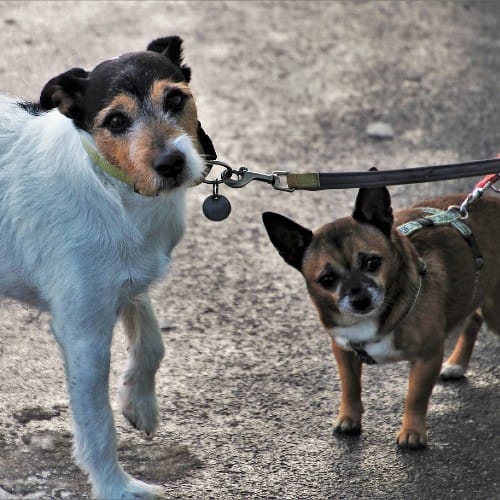Many dog owners have heard of the leptospirosis vaccine, but not everyone realizes just how serious the disease can be, or how easily dogs in Florida can be exposed. Leptospirosis is a growing concern for pets in our area, especially in warm, wet climates where the bacteria thrive.
At Paws and Claws Veterinary Hospital, our team wants pet parents to understand the real risks this illness poses and how simple prevention measures, including vaccination, can help protect dogs and the families who love them.
What Is Leptospirosis?
Leptospirosis is a bacterial infection caused by Leptospira organisms found in water and soil contaminated with the urine of infected animals. Wildlife, such as raccoons, rats, and opossums, as well as livestock, can carry and spread the bacteria without showing any signs of illness.
Dogs can become infected when they drink, swim in, or walk through contaminated water, or when the bacteria enter the body through small cuts in the skin or mucous membranes. Once inside, the infection can affect the kidneys and liver, and in severe cases, become life-threatening.
Leptospirosis is also zoonotic, which means it can be transmitted from animals to humans. That makes prevention not only important for your dog’s health, but for your family’s safety as well.

How Do Dogs Get Leptospirosis?
As we mentioned before, leptospirosis spreads through contact with water, soil, or objects contaminated with the urine of infected animals. Because the bacteria thrive in warm, wet conditions, dogs in Florida are at risk year-round, especially during the rainy season.
Common ways dogs can become exposed include:
-
Drinking from puddles, ponds, or standing water where wildlife may have urinated.
-
Walking or swimming through contaminated water or mud, particularly if they have small cuts on their skin.
-
Sniffing or licking areas where infected animals have been.
-
Exposure in backyards or parks, since urban wildlife like rats, squirrels, and raccoons can carry the bacteria.
Even dogs who rarely leave the yard or spend most of their time indoors can still be at risk – especially after heavy rain or flooding. That’s why prevention is recommended for nearly all dogs living in our area.
Symptoms of Leptospirosis in Dogs
Leptospirosis can affect dogs in different ways—some may show only mild illness, while others develop severe, life-threatening infections. The bacteria often target the kidneys and liver, leading to inflammation and organ damage if left untreated.
Early signs can be easy to overlook because they resemble other common illnesses. Symptoms may include:
-
Fever or shivering
-
Lethargy or weakness
-
Loss of appetite
-
Vomiting or diarrhea
-
Increased thirst or urination

As the disease progresses, more serious symptoms may appear, such as:
-
Yellowing of the eyes or gums (jaundice)
-
Dehydration
-
Abdominal pain
-
Difficulty breathing
If you notice any of these signs, especially after your dog has been exposed to standing water or wildlife, it’s important to contact your veterinarian right away. With early diagnosis and treatment, many dogs recover fully.
Diagnosis and Treatment
Because leptospirosis can look like many other illnesses, your veterinarian will use a combination of tests and clinical signs to make a diagnosis. Bloodwork and urine tests can help detect changes in the kidneys or liver, while specific antibody or PCR tests confirm the presence of Leptospira bacteria.
If your dog tests positive, early treatment is critical. Leptospirosis is treated with antibiotics, which can eliminate the infection and reduce the risk of spreading it to other animals or people. In more serious cases, hospitalization may be needed for intravenous fluids, medications, and supportive care to protect the kidneys and liver.
Most dogs recover well when treatment begins early, but prompt veterinary attention is key. Left untreated, the disease can lead to organ failure and can be life-threatening.
Can Leptospirosis Be Prevented?
The good news is that yes, leptospirosis can be prevented. The most effective protection comes from vaccination, which helps your dog build immunity against the most common strains of Leptospira bacteria.
At PCVH, we recommend the leptospirosis vaccine for dogs in the Tallahassee area. Because the bacteria are so common in Florida’s warm, humid environment, even dogs who don’t swim or spend much time outdoors can still be at risk.
The vaccine is typically given as part of your dog’s annual wellness care, with an initial series followed by yearly boosters to maintain protection.
You can also help reduce your dog’s risk by:
-
Avoiding puddles, ponds, or standing water where wildlife may have been.
-
Keeping your yard clean and discouraging rodents or wildlife.
-
Practicing good hygiene—wash your hands after handling your dog, especially if they’ve been ill.
Preventing leptospirosis is far safer and easier than treating it. With regular vaccination and a few simple precautions, you can protect both your pet and your family.
Schedule Your Dog’s Lepto Vaccine Today
If you’re ready to protect your dog from leptospirosis today, call our office to schedule an appointment.

